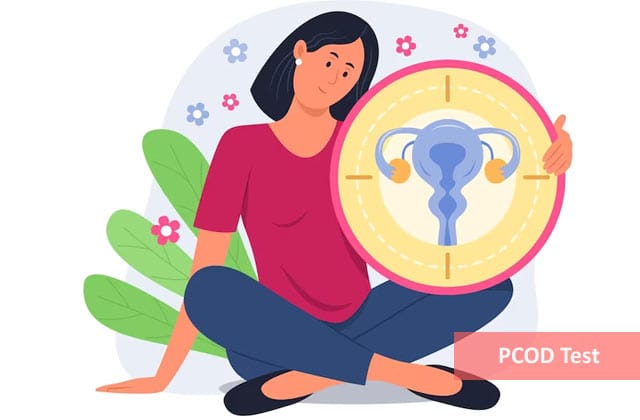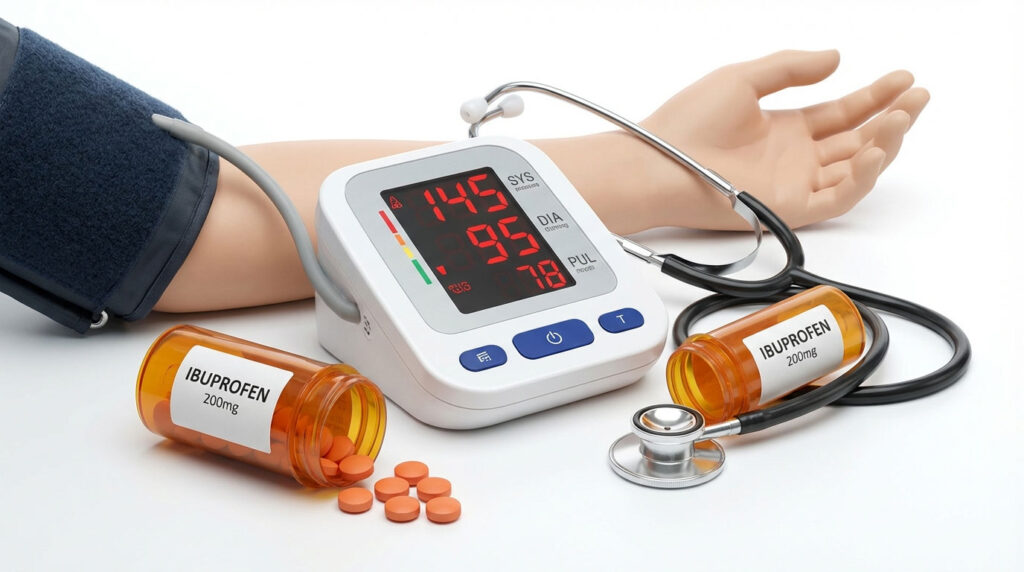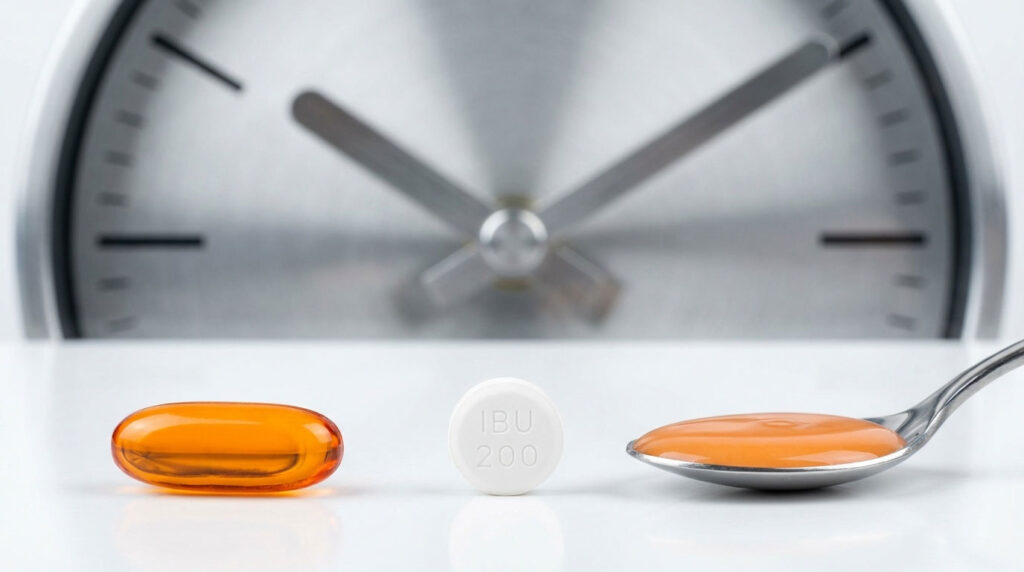PCOD Profile Test
Diabetes (6)
- AVERAGE BLOOD GLUCOSE (ABG)
- FASTING BLOOD SUGAR(GLUCOSE)
- HbA1c
- HOMA INSULIN RESISTANCE INDEX
- INSULIN - FASTING
- QUANTITATIVE INSULIN SENSITIVITY INDEX
Complete Hemogram (28)
- BASOPHILS
- BASOPHILS - ABSOLUTE COUNT
- EOSINOPHILS
- EOSINOPHILS - ABSOLUTE COUNT
- HEMATOCRIT(PCV)
- HEMOGLOBIN
- IMMATURE GRANULOCYTE PERCENTAGE(IG%)
- IMMATURE GRANULOCYTES(IG)
- LYMPHOCYTE
- LYMPHOCYTES - ABSOLUTE COUNT
- MEAN CORP.HEMO.CONC(MCHC)
- MEAN CORPUSCULAR HEMOGLOBIN(MCH)
- MEAN CORPUSCULAR VOLUME(MCV)
- MEAN PLATELET VOLUME(MPV)
- MONOCYTES
- MONOCYTES - ABSOLUTE COUNT
- NEUTROPHILS
- NEUTROPHILS - ABSOLUTE COUNT
- NUCLEATED RED BLOOD CELLS
- NUCLEATED RED BLOOD CELLS %
- PLATELET COUNT
- PLATELET DISTRIBUTION WIDTH(PDW)
- PLATELET TO LARGE CELL RATIO(PLCR)
- PLATELETCRIT(PCT)
- RED CELL DISTRIBUTION WIDTH - SD(RDW-SD)
- RED CELL DISTRIBUTION WIDTH (RDW-CV)
- TOTAL LEUCOCYTES COUNT (WBC)
- TOTAL RBC
Pregnancy (1)
- ESTRADIOL/OESTROGEN (E2)
Infertility (4)
- FOLLICLE STIMULATING HORMONE (FSH)
- FREE TESTOSTERONE
- LUTEINISING HORMONE (LH)
- PROLACTIN (PRL)
Lipid (10)
- HDL / LDL RATIO
- HDL CHOLESTEROL - DIRECT
- LDL / HDL RATIO
- LDL CHOLESTEROL - DIRECT
- NON-HDL CHOLESTEROL
- TC/ HDL CHOLESTEROL RATIO
- TOTAL CHOLESTEROL
- TRIG / HDL RATIO
- TRIGLYCERIDES
- VLDL CHOLESTEROL
Thyroid (1)
- TSH - ULTRASENSITIVE
What Is Polycystic Ovarian Disease Test?
The Polycystic Ovarian Disease (PCOD) test is a series of blood tests and ultrasounds used to diagnose PCOD by assessing hormone levels and ovarian health. It helps identify symptoms like irregular menstruation, excessive hair growth, and acne linked to hormonal imbalances.
PCOD is diagnosed when excess production of androgens (male hormones) takes place and disrupts the normal functioning of the ovaries. Such a hormonal disorder is commonly seen in women of reproductive age 1.
PCOD leads to irregular menstrual cycles, excessive facial hair growth, facial acne, sudden weight gain, and difficulty in conceiving. It may also result in the formation of cysts in the ovaries, which can cause severe pain and discomfort. The exact cause of PCOD is still unknown, but it is believed to be a mix of environmental, genetic, and lifestyle factors.
About PCOD Test
Learn everything about the test to detect PCOD before you book lab test online. Understand the why, how, and what of this test.
What Does a PCOD Panel Test Measure?
The PCOD blood test is a crucial diagnostic examination that measures hormonal imbalances, identifies potential signs of Polycystic Ovarian Disease (PCOD), and guides the development of individualised treatment strategies for affected patients.
The following PCOD profile test list is a critical guide outlining crucial assessments like LH, FSH, testosterone, TSH, FPG, and HCG. This approach facilitates the accurate diagnosis of PCOD and informs the development of individualised treatment plans tailored to each patient’s unique health needs. But these tests alone can’t fully confirm PCOD—an ultrasound is required to show multiple ovarian cysts.
- LH Test2: A Luteinising hormone is a blood-borne chemical messenger that regulates the function of certain cells or organs. LH is often tested in a blood sample. However, it might be measured in pee (urine) in some circumstances. Higher than normal LH levels could be a sign of PCOD.
- FSH test3: This test measures follicle-stimulating hormone levels in the blood. It is crucial for sexual development in children and fertility in adults. In women, it regulates the menstrual cycle and egg production, while in men, it influences sperm production. During puberty, FSH, along with other hormones, triggers physical changes like estrogen production in girls and testosterone production in boys, impacting secondary sexual characteristics. Low FSH levels could indicate potential PCOD.
- Testosterone test4: A testosterone test measures the amount of testosterone in a blood sample. Testosterone is a hormone produced by the testicles, ovaries, and adrenal glands, affecting various bodily functions and characteristics. The test helps diagnose conditions related to abnormal testosterone levels. High testosterone levels could also be an indicator of PCOD.
- TSH test5: This is called the Thyroid Stimulating Hormone test. It is vital for assessing thyroid-related conditions, high or low TSH levels could indicate a thyroid problem. Low levels of TSH could cause menstrual changes resembling those associated with PCOD.
- SHBG Test: This test measures the levels of sex hormone-binding globulin (SHBG) in the blood. SHBG is a protein produced in the liver that binds to sex hormones like testosterone and estrogen, regulating their availability in the body. When SHBG binds to sex hormones, they become inactive and unavailable for use by tissues. Low SHBG levels in females can indicate PCOD.6
- FPG: The fasting plasma glucose test measures the body’s glucose levels after a fasting period of 8-12 hours. High FPG levels are a sign of diabetes susceptibility, which can lead to PCOD 7.
- AMH Test: An anti-mullerian hormone (AMH) test measures the amount of AMH in a blood sample. In females, the ovaries produce AMH, which helps in egg formation and hormone production. High AMH levels indicate a larger supply of eggs, while low levels suggest fewer eggs remaining in the ovaries, which can affect fertility.
High levels of AMH are a sign of PCOD, as AMH is released from immature antral follicles in the ovaries, which are the small fluid-filled cyst-like structures. AMH inhibits a follicle’s ability to mature into an egg, preventing ovulation, causing longer menstrual cycles, and leading to infertility. 8
- Oestrogen Level Test: This test measures oestrogen levels in the blood, a key hormone in the female reproductive system. Oestrogen levels fluctuate throughout the menstrual cycle, with high levels prompting ovulation and low levels triggering menstruation. Both high and low oestrogen levels can contribute to longer menstrual cycles, a common symptom of PCOD. 9
- Prolactin Test: This test measures prolactin levels in the blood, a hormone produced by the pituitary gland that promotes lactation. Elevated prolactin levels (hyperprolactinemia) can cause irregular menstruation (oligomenorrhea) or the absence of menstruation (amenorrhea), which is seen in PCOD 10.
The signs and symptoms of insulin resistance and thyroid problems are similar to those of PCOD, and there is a notion that PCOD, insulin resistance, and thyroid issues are interconnected.
As a result, the above PCOD profile test list is carried out to identify these illnesses prior to PCOD diagnosis confirmation.
What are the Signs and Symptoms that Lead to Immediate PCOD Testing:
Every patient has some noticeable PCOD symptoms, which are somewhat frequent. The following is a list of some typical symptoms of the illness 11:
- Acne: Individuals with PCOD may experience noticeable acne on various parts of their body, including the face, neck, and back.
- Weight Gain: PCOD often leads to significant weight gain, despite efforts to lose it through activities such as gym workouts, aerobics, and physical exercise.
- Hair Thinning: PCOD can cause thinning of scalp hair, even with the use of hair growth oils.
- Irregular Menstrual Cycles: Irregular menstruation, characterised by fewer than nine periods in a year, is a common and prominent symptom of PCOD.
- Fertility Problems: In some cases of PCOD, fertility problems may occur.
- Depression: Due to all the changes the disease causes to her body, a woman also experiences depression.
These are a few PCOD symptoms that you should be aware of. If you notice anything strange about your health, speak with a doctor as soon as possible and take a PCOD panel test.
Why Do Doctors Recommend PCOD Panel Test?
Here are the reasons why doctors recommend PCOD tests:
Diagnosis and Confirmation:
- Blood tests for PCOD are crucial for diagnosing the condition. These tests measure hormones related to the pituitary, adrenal glands, cholesterol, blood sugar, and thyroid. They help rule out other conditions with similar symptoms.
- The lipid panel measures cholesterol and triglycerides, as PCOD increases the risk of heart disease 12.
- Glucose tests assess the possibility of diabetes, which is associated with PCOD.
Monitoring and Management:
- Regular blood pressure, glucose tolerance, and cholesterol/triglyceride level checks are essential for monitoring PCOD-related complications.
- Doctors also screen patients for depression, anxiety, and bipolar disorder related to their physical health issues..
Understanding Hormonal Imbalance:
- PCOD results from insulin resistance, leading to excess sugar conversion into fat. This contributes to obesity, irregular periods, and increased cardiovascular risk.
- Elevated hormone levels cause symptoms like acne, excess hair growth, weight gain, and sometimes infertility.
Remember, while PCOD cannot be cured, its symptoms can be effectively managed through lifestyle changes and medical interventions. Regular tests play a crucial role in understanding and addressing this condition.
How to Prepare for the PCOD Profile Test?
It is advised to be under fasting (not eat anything) for at least 8-12 hours before the healthcare provider can collect your blood for the PCOD Profile Test. It is important to note that fasting is required for this test to get accurate results. This means that you will need to refrain from consuming anything (except water) for at least 8 hours before your scheduled appointment.
However, if you are currently taking any medications, it is important to let the provider know this before the test. They might request you to stop taking certain medications before the test for accurate results.
It is also best to avoid drinking alcohol or using drugs at least 48 hours before the test, as it may hamper the test result’s accuracy.
What Happens During PCOD Check-Up?
A blood test for PCOD only takes a few minutes.
- As per the scheduled time of the blood test, a Lab Technician who usually takes blood samples will arrive.
- A thin needle will be used to draw blood from your arm’s vein.
- The needle might cause a mild pinch and some discomfort.
- The lab technician then fills a collection tube with blood and then removes the needle from the skin.
- They place a small bandage on the arm.
- These samples are then sent over to the laboratory for analysis of the levels of testosterone, luteinizing hormone (LH), follicle-stimulating hormone (FSH), and estrogen.
Please note: You might feel slight pain at the spot where the needle was inserted, but most of the symptoms go away quickly.
In addition, an ultrasound examination of the ovaries can also be suggested by the healthcare provider to identify cysts on the ovaries and assess the size and number of the cysts.
Finding PCOD Test
Should you book blood test online to check your PCOD levels or go to the nearest clinic and get it done by a medical professional? Let’s Find Out
Can I Take the PCOD Test at home?
Yes, it’s possible to take the PCOD test at home. Healthcareontime’s at-home lab testing service, in association with thyrocare, provides a convenient and efficient way to get important medical tests done from the comfort of your own home, without the need for a doctor’s visit or a trip to a lab. It’s important to note that consulting with a healthcare professional about any concerns regarding your test results is always a good idea.
How Much Does PCOD Profile Test Cost?
The PCOD profile test price varies significantly depending on many factors.
- Location: The PCOD test price in India may vary depending on the city or the region in which the test is conducted. For example, in Bangalore or Mumbai, it might be expensive compared to small towns.
- Type of facilities centres: The PCOD test price also varies between private hospitals, government hospitals, and diagnostic centres. Cost is lower in government hospitals as compared to private ones.
- Healthcare centres: Diagnostic centres, laboratories and hospitals may have different PCOD test prices. It depends upon the benefits and reputation of the healthcare centre.
- Insurance Coverage: Individuals with health insurance can cover partial or all cost, depending on their policy coverage and network providers.
- Other tests: PCOD can be part of a larger panel of tests, such as a hormone test. The overall cost may vary depending on the number and type of tests included in the panel.
- Additional services: Additional services such as home sample collection, express test results, or additional charges for special management may be paid, which contributes to the overall PCOD blood test cost.
The PCOD profile test price varies depending on various factors, such as where you live, the healthcare provider or a laboratory that performs the test, and whether or not you have health insurance coverage.
Generally, the PCOD profile test cost in India ranges from Rs. 1500 to Rs. 3,000. We at HealthcareOnTime offer PCOD test prices at INR 1999.
By opting for HealthcareOnTime lab test at-home facilities, you can access comprehensive Thyrocare PCOD Test Packages. Ensure your well-being by incorporating PCOD profile blood test into your routine health checkups with our convenient at-home testing services.
| Package Type | Parameters Covered | Price (INR) |
| PCOD Profile Test | 47 parameters | Rs. 1999 |
Test Result Interpretation
You received your PCOD Panel test results but still need help determining if they fall under the normal range. Read this section to know if your results range between the PCOD normal range.
What Do Polycystic Ovarian Disease Test Results Mean?
Different blood tests performed during PCOD diagnosis may indicate the presence of PCOD if certain abnormalities are detected.
- LH Test: Higher than normal LH levels could indicate PCOD.
- FSH Test: Low FSH levels could indicate potential PCOD.
- Testosterone Test: High testosterone levels could also be an indicator of PCOD.
- TSH Test: Low levels of TSH could cause menstrual changes similar to those seen in PCOD.
- SHBG Test: Low SHBG levels in females can indicate PCOD.
- FPG Test: High FPG levels are a sign of diabetes susceptibility, which can lead to PCOD.
- AMH Test: High levels of AMH are a sign of PCOD.
- Oestrogen Levels Test: Both high and low oestrogen levels can contribute to longer menstrual cycles, a common symptom of PCOD.
- Prolactin Test: Elevated prolactin levels can cause irregular menstruation, as seen in PCOD.
However, it must be noted that to confirm PCOD, an ultrasound is required.
What Is The Normal Range Of A PCOD Test?
The normal PCOD levels vary depending on age and the laboratory performing the test. Please refer to the table below to check the normal range.
| Hormone | Normal Range |
| Follicular Phase: 1.68–15 IU/L Mid-Cycle Peak: 21.9–56.6 IU/L Luteal Phase: 0.61–16.3 IU/L For postmenopausal females, the normal range is 14.2–52.3 IU/L. 13 | |
| Follicle-stimulating hormone (FSH) | 4.7-21.5 IU/L 14 |
| Adult females: 15-70 ng/dL 13-17 years old: 16.72-31.55 ng/dL 7–10 years old: 2.69-10.29 ng/dL 15 | |
| TSH Levels | 0.4 – 4.0 mU/L16 |
| SHBG levels | 19-145 nmol/L17 |
| Between 70mg/dL and 100 mg/dL 18 | |
| < 5 mIU/mL in females who are not pregnant.19 | |
| AMH levels | 1.0 – 3.0 ng/mL 20 |
| Estrogen Levels | Follicular phase: 20-350 pg/mL Midcycle peak: 150-750 pg/mL Luteal phase: 30-450 pg/mL Postmenopause: ≤ 20 pg/mL 21 |
| Prolactin Levels |
|
| 5-20 ng/mL |
Early Detection & Diagnosis Importance
PCOD is a hormonal imbalance that affects a significant number of women. While it can manifest through various symptoms, early detection and diagnosis are crucial for managing its impact on both your current and long-term health. Here’s why:
A. Link Between PCOD and Long-Term Health Risks
Uncontrolled PCOD can increase your risk of developing several chronic health conditions. Let’s explore some of the most common ones:
- Diabetes and Insulin Resistance
Women with PCOD are more prone to developing insulin resistance, a condition where your body struggles to utilise insulin effectively. This can eventually lead to type 2 diabetes.
- Cardiovascular Health
PCOD can contribute to an increased risk of heart disease and stroke. This is due to factors like high blood pressure, unhealthy cholesterol levels, and inflammation associated with the condition.
B. Impact on Fertility
PCOD can disrupt ovulation, making it challenging to conceive naturally. However, early diagnosis and management can significantly improve your chances of a healthy pregnancy. Here’s how:
- Assessing Ovarian Function
A PCOD diagnosis will involve evaluating your hormone levels and ovarian health through blood tests and potentially, a pelvic ultrasound. This assessment helps determine whether ovulation is occurring regularly and evaluates the quality of your eggs.
- Strategies for Managing Fertility Concerns
Once doctors understand your specific situation, they can recommend various treatment options to regulate ovulation and support your fertility journey. This may include lifestyle changes, medication, or assisted reproductive technologies.
Early detection of PCOD empowers you to take proactive measures toward managing these potential risks. By working with your doctor and taking a PCOD panel test, you can establish a personalised treatment plan to optimise your overall health and well-being.
Disclaimer: Although we have endeavoured to provide accurate information on this page, we strongly recommend that you seek advice from your doctor before relying on any of the test ranges or lab-test recommendations mentioned herein.
Sources
Ref Links:
- Polycystic Ovary Syndrome (PCOS): Symptoms, Causes, and Treatment
- Luteinizing Hormone (LH) Levels Test
- Follicle-Stimulating Hormone (FSH) Levels Test
- Testosterone Levels Test
- TSH (Thyroid-stimulating hormone) Test
- SHBG Blood Test
- Fasting plasma glucose test
- Anti-Müllerian Hormone Test
- Blood Tests for PCOS
- How test results help to diagnose PCOS and related conditions
More Related Tests
Why To Book with HealthCareOnTime

17 Crores+ Samples Processed

World Class Technology Labs

25+ Years of Trust & Experience











